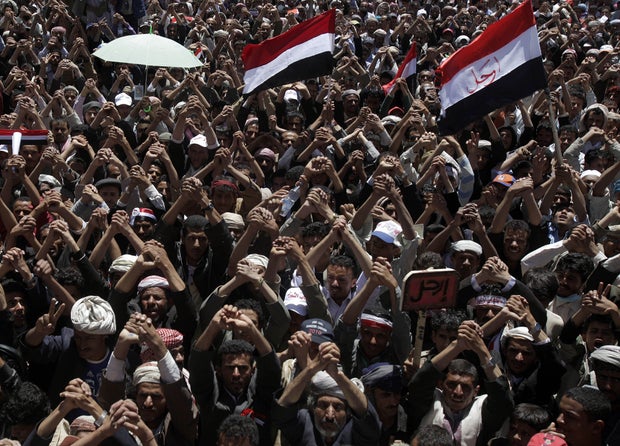NYT: U.S. now seeks departure of Yemeni president
Throughout weeks of increasingly bloody protests in Yemen, which have called for the ouster of President Ali Abdullah Saleh, the United States has publicly and privately withheld criticism over the Yemeni government handling of the crisis.
Saleh, a U.S. ally in its fight against al Qaeda, has been spared the disapprobation from Washington that has dispensed towards other Middle East leaders targeted by popular uprisings. But that may be changing.
Reporting in The New York Times Monday, Laura Kasinof and David Sanger write that Obama administration officials have quietly told its allies that they now view Saleh's continued position is untenable, and that he should leave.
A Yemeni official told the Times that Saleh has been in negotiation with the United States about his potential departure and handover of power. The talks began in the wake of the March 18 protest in which gunmen tied to Saleh's government killed more than 50 demonstrators. The bloodshed prompted many high-level officials to defect.
The Times reports a key part of the negotiations with the U.S. is Washington's determination that its current counterterrorism operations be allowed to continue even after Saleh leaves office. It was not reported whether the talks have included a possible safe haven for Saleh.
Troops fire on Yemeni protesters, 6 killed
Yemeni police attack 1,000s of female protesters
Complete coverage: Anger in the Arab World
Mohammed Abulahom, a ruling party member of Parliament who supports the protesters, told the Times the talks demonstrate U.S. willingness to see a transfer of power.
Americans "are doing what ought to be done, and we will see more pressure down the road," Abulahom told the Times.
The U.S. has been criticized for not publicly supporting Yemeni protesters as it has protesters in Tunisia, Egypt and Libya.
"We are really very, very angry because America until now didn't help us similar to what Mr. Obama said that Mubarak has to leave now," Tawakul Karman, a protest leader, told the Times. "Obama says he appreciated the courage and dignity of Tunisian people. He didn't say that for Yemeni people.
"We feel that we have been betrayed," she said.
